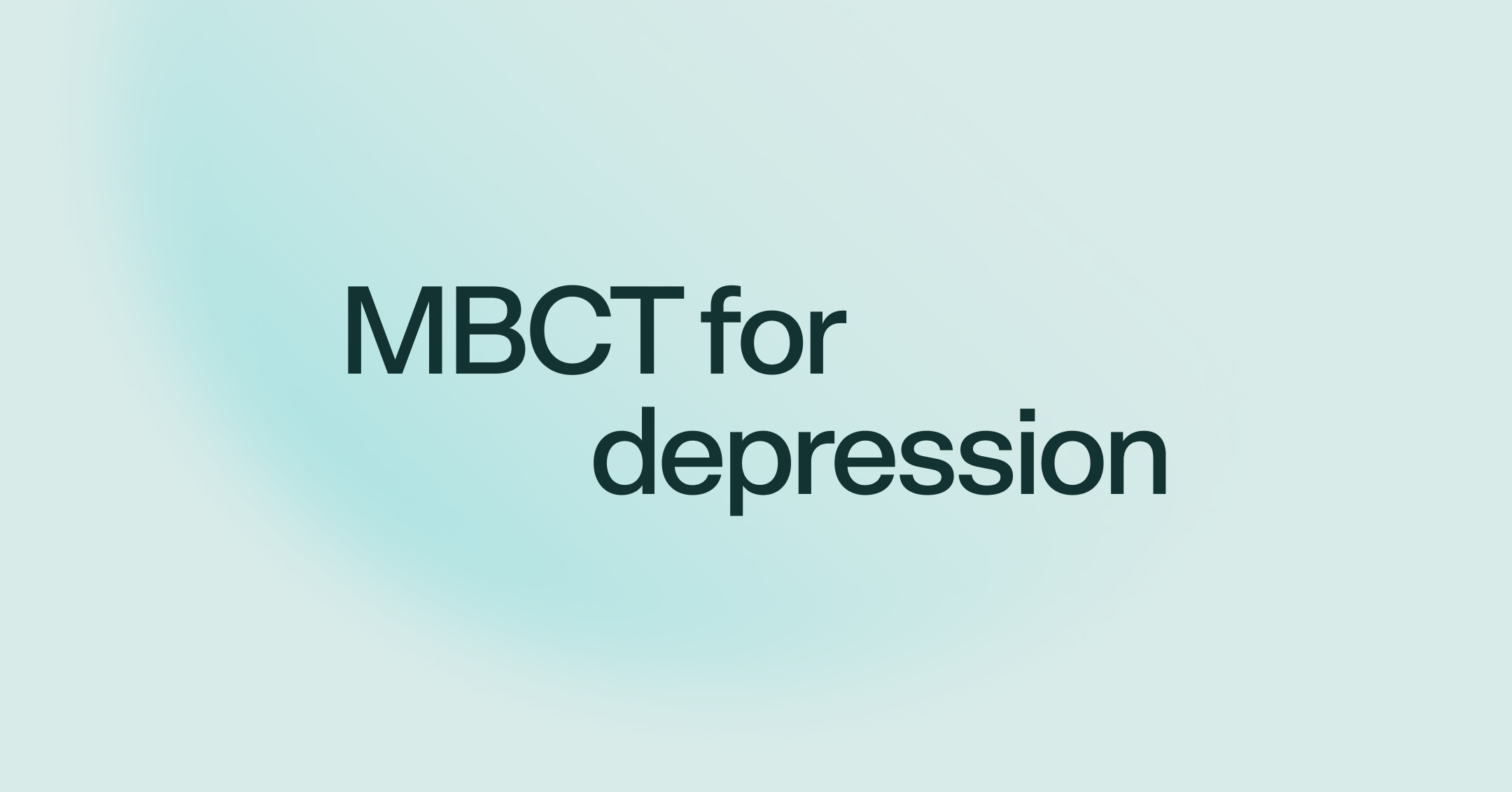Mindfulness-based cognitive therapy (MBCT) combines elements of cognitive behavioral therapy (CBT) with mindfulness techniques like meditation and breathing exercises.
MBCT has been shown to decrease depressive symptoms, prevent recurrence, and help people better understand their thoughts and emotions.
Through MBCT, you can learn how to stay present, shift negative thought patterns, and support your mental health.
If you or someone you care about is feeling down or hopeless, you’re not alone. In the U.S., depression rates have risen, with many people looking for ways to feel better and support their mental health.
Although depression is treatable, there’s no one-size-fits-all fix approach to treatment. Some people find relief with therapy, while others benefit from medication, exercise, and meditation. One promising treatment approach is mindfulness-based cognitive therapy (MBCT), which combines mindfulness and elements of cognitive behavioral therapy (CBT) to improve coping skills and emotional resilience. Typically offered as a therapist-led eight-week program, MBCT has been shown to help people prevent relapse with major depression disorder (MDD), including those who haven’t found relief with other treatments.
How mindfulness helps with depression
Mindfulness encourages living in the present moment. Research suggests that mindfulness-based interventions like yoga, meditation, and deep breathing can help reduce the symptoms of anxiety and depression. MBCT takes mindfulness a step further, combining elements of CBT with mindfulness practices, offering many benefits.
MBCT has been shown to:
Reduce the intensity of mood and anxiety symptoms
Improve lingering depression symptoms among those who’ve already received treatment
Help manage treatment-resistant depression symptoms
Improve sleep quality and reduce depression-related insomnia
Reduce rumination, a thought pattern that involves dwelling on worries or negative thoughts
Additionally, mindfulness has been shown to help with the symptoms of post-traumatic stress disorder (PTSD) and panic disorders, which may co-occur with depression.
The care you need, when you need it
Learn how Rula can support your mental health journey
What to expect from MBCT for depression
MBCT is an eight-week program, typically offered in group settings but also adapted for individual therapy. Led by trained mental health professionals, MBCT increases awareness of thoughts, emotions, and bodily sensations. Using mindfulness techniques like meditation and breathing exercises, MBCT can help you address negative thought patterns and reduce depression symptoms.
Additionally, this therapeutic approach can support you in:
Developing self-compassion
Managing difficult emotions rather than avoiding them
Accepting things the way they are
Reducing rumination
Research suggests that MBCT can be as effective as ongoing depression medication in preventing relapses. In addition, one study found people with severe depression not only improved their symptoms with MBCT but also experienced less overthinking and anxiety, along with a stronger sense of mindfulness.
How does MBCT differ from other types of therapy?
You might be wondering how MBCT is different from other popular forms of therapy often used for depression. MBCT is unique because it:
Combines mindfulness and cognitive therapy techniques: While CBT focuses on changing negative thought patterns, MBCT teaches you to observe your thoughts non-judgmentally and without immediate reactions, helping to reduce their emotional impact.
Focuses on relapse prevention: MBCT was specifically designed to help prevent relapse in people who have recovered from depression. It helps you recognize early signs of depressive relapse and respond with mindfulness rather than automatic negative thinking.
Works in a variety of formats: Although MBCT is typically offered in a group format, it can also be adapted for individual therapy sessions, providing flexibility in treatment options to suit your needs.
Prioritizes acceptance over avoidance: MBCT prioritizes acceptance over avoidance. Instead of confronting fears directly like exposure therapy, it encourages accepting discomfort and difficult emotions through mindfulness, allowing them to pass without becoming overwhelming.
Finding the right MBCT therapist
While a therapist’s profile may mention mindfulness, it’s important to verify whether they have formal training in MBCT or simply use mindfulness techniques in combination with traditional talk therapy. Additionally, you can ask a therapist what kind of mindfulness exercises and homework they typically assign so you know what to expect.
Here are seven other questions that can help you find a therapist who’s aligned with your needs and goals:
How do you measure progress in MBCT?
Have you worked with clients facing similar challenges to mine (depression, anxiety, relapse prevention)?
What happens after completing an MBCT program? Are there follow-ups or additional resources?
Will it take the full eight weeks for me to see changes, or might I see improvements sooner?
How do I know if MBCT is the right approach for me?
What does a typical MBCT session look like?
Can MBCT be combined with other forms of therapy or medication?
To make an informed decision about your treatment, discuss these questions with a therapist to ensure they have the experience and approach that’s aligned with your goals.
MBCT combines mindfulness practices with cognitive therapy to help you observe your thoughts without reacting, fostering acceptance rather than avoidance. This approach can help you feel more in control of your emotions and thoughts.

Brandy Chalmers, LPC
Clinical reviewer
Find care with Rula
If you or someone you care about experiences treatment-resistant depression, MBCT might help. Through mindfulness and cognitive therapy techniques, you can learn to break free from negative thoughts, prevent relapses, and view yourself with more kindness and acceptance.
At Rula, we’re committed to delivering a comprehensive behavioral health experience that helps people feel seen and understood so they can get back to feeling their best.
Rula makes it easier to find a licensed therapist or psychiatric provider who accepts your insurance so you don’t have to choose between affordable care and excellent care. With a diverse network of more than 15,000 providers, 24/7 crisis support, and appointments available as soon as tomorrow, we’re here to help you make progress — wherever you are on your mental health journey.
Rula's editorial process
Rula's editorial team is on a mission to make science-backed mental health insights accessible and practical for every person seeking to better understand or improve mental wellness.
Members of Rula’s clinical leadership team and other expert providers contribute to all published content, offering guidance on themes and insights based on their firsthand experience in the field. Every piece of content is thoroughly reviewed by a clinician before publishing.




